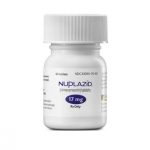Valbenazine (Ingrezza): Uses, Mechanism of Action, Dosage, Side Effects

What Is Valbenazine (Ingrezza) And What Does It Treat?
Valbenazine (Ingrezza) is a medication approved by the FDA in 2017 and is used to decrease the frequency and severity of involuntary, uncontrollable muscle movements that are related to a condition known as Tardive Dyskinesia (TD). TD is associated with chronic use of certain medications, such as antipsychotics.
Tardive dyskinesia (TD) is an involuntary neurological movement disorder caused by the use of dopamine receptor blocking drugs that are prescribed to treat certain psychiatric or gastrointestinal conditions. Tardive dyskinesia affects an estimated 500,000 persons in the United States. About 60% to 70% of cases are mild, and about 3% are extremely severe. Particularly at risk are patients who have been treated for schizophrenia, schizoaffective disorder, or bipolar disorder.
How does Valbenazine (Ingrezza) work in tardive dyskinesia?
Valbenazine (Ingrezza) is in a class of medications called vesicular monoamine transporter 2 (VMAT2) inhibitors and its mechanism of action in the treatment of tardive dyskinesia is mediated through the reversible inhibition of VMAT2. VMAT2 is selective to the central nervous system and is responsible for the transport and recycling of neurotransmitters across the synapse which are part of the circuit that connects sensory organs, like those that detect pain or touch, in the peripheral nervous system to the brain.
What Is The Most Important Information I Should Know About Valbenazine (Ingrezza)?
For Valbenazine (Ingrezza) to work properly, it should be taken every day as prescribed by your healthcare provider.
Missing doses of Valbenazine (Ingrezza) may increase your risk for a relapse in your symptoms.
Valbenazine (Ingrezza) may cause drowsiness. Avoid activities that require alertness, such as driving a car or operating machinery until you learn how your body responds to it.
If you feel faint or have heart palpitations, consult with your doctor immediately.
With input from you, your health care provider will assess how long you will need to take the medicine. Do not stop taking Valbenazine (Ingrezza) or change your dose without talking to your healthcare provider first.
What Should I Discuss With My Healthcare Provider Before Taking Valbenazine (Ingrezza)?
• Symptoms of your condition that bother you the most
• If you have thoughts of suicide or harming yourself
• Medications you have taken in the past for your condition, whether they were effective or caused any adverse effects
• If you experience side effects from your medications, discuss them with your provider. Some side effects may pass with time, but others may require changes in the medication.
• Any other psychiatric or medical problems you have, such as depression, heart rhythm problems, long QT syndrome, heart attacks, kidney disease, or liver disease
• All other medications you are currently taking (including over-the-counter products, herbal and nutritional supplements) and any medication allergies
• Other non-medication treatment you are receiving, such as talk therapy or substance abuse treatment
• If you are pregnant, plan to become pregnant, or are breast-feeding
• If you drink alcohol or use illegal drugs
How Should I Take Valbenazine (Ingrezza)?
Valbenazine (Ingrezza) is usually taken once a day, with or without food.
Typically, patients begin at 40 mg once a day and the dose may be increased to 80 mg once a day after a week of treatment. Only your health care provider can determine the correct dose for you.
You will need to plan for a caregiver or family member to drive you home after each treatment.
Use a calendar, pillbox, alarm clock, or cell phone alert to help you remember to take your medication. You may also ask a family member or a friend to remind you or check in with you to be sure you are taking your medication.
What Happens If I Miss A Dose Of Valbenazine (Ingrezza)?
If you miss a dose of Valbenazine (Ingrezza), take it as soon as you remember, unless it is closer to the time of your next dose. Discuss this with your healthcare provider. Do not double your next dose or take more than what is prescribed.
What Should I Avoid While Taking Valbenazine (Ingrezza)?
Avoid drinking alcohol or using illegal drugs while you are taking Valbenazine (Ingrezza). They may decrease the benefits (e.g. worsen your condition) and increase adverse effects (e.g. sedation) of the medication. When taking Valbenazine (Ingrezza) for the first time, do not drive or operate dangerous machinery until you know how the medication affects you.
What Happens If I Overdose With Valbenazine (Ingrezza)?
If an overdose occurs, call your doctor or 911. You may need urgent medical care. You may also contact the poison control center at 1-800-222-1222. A specific antidote to reverse the effects of Valbenazine (Ingrezza) does not exist.
How Long Does It Take For Valbenazine (Ingrezza) To Work?
It is very important to tell your doctor how you feel things are going during the first few weeks after you start taking Valbenazine (Ingrezza). It may take several weeks to see big enough changes in your symptoms to decide if Valbenazine (Ingrezza) is the right medication for you.
Can a pregnant woman take Valbenazine (Ingrezza)?
If you are planning on becoming pregnant, notify your healthcare provider to best manage your medications. People living with TD who wish to become pregnant face important decisions. Currently, there are no well-controlled human studies of Valbenazine (Ingrezza) in pregnancy. However, increased rates of stillbirths were seen in animal studies. It is important to discuss the risk and benefits of treatment with your doctor and caregivers.
Can a breastfeeding woman take Valbenazine (Ingrezza)?
Caution is advised with breastfeeding since it is not known if Valbenazine (Ingrezza) passes into your breast milk. However, increased rates of fetal and newborn mortality were seen in animal studies. Therefore, the manufacturer recommends against breastfeeding during treatment with Valbenazine (Ingrezza) and for 5 days after the last dose. Talk to your doctor about the best way to feed your baby during treatment with Valbenazine (Ingrezza).
What Are The Possible Side Effects Of Valbenazine (Ingrezza)?
Valbenazine (Ingrezza) may cause side effects. Tell your doctor if any of these symptoms are severe or do not go away:
• tiredness
• dizziness, trouble walking, or changes in balance
• dizziness
• restlessness
• vomiting
• joint pain
Some side effects can be serious. If you experience any of these symptoms, call your doctor immediately or get emergency medical treatment:
• rash
• hives
• itching
• swelling of the face, lips, or mouth
• feeling faint
• fainting or loss of consciousness
• fast or irregular heartbeat
• shortness of breath
Valbenazine (Ingrezza) may cause other side effects. Call your doctor if you have any unusual problems while taking this medication.
Are There Any Risks For Taking Valbenazine (Ingrezza) For Long Periods Of Time?
To date, there are no known problems associated with the long-term use of Valbenazine (Ingrezza). It is a safe and effective medication when used as directed.
What Other Medications May Interact With Valbenazine (Ingrezza)?
Valbenazine (Ingrezza) should not be taken with or within 2 weeks of taking monoamine oxidase inhibitors (MAOIs), as these medications can increase side effects and decrease the effectiveness of Valbenazine (Ingrezza). MAOIs include phenelzine (Nardil®), tranylcypromine (Parnate®), isocarboxazid (Marplan®), and selegiline (Emsam®).
Valbenazine (Ingrezza) should not be taken with tetrabenazine (Xenazine®) or deutetrabenazine (Austedo®)
The following medications may increase the levels and effects of Valbenazine (Ingrezza):
• The antidepressants paroxetine (Paxil®) and fluoxetine (Prozac®)
• Antifungal medications itraconazole (Sporanox®) and ketoconazole (Nizoral®) and antibiotics like clarithromycin (Biaxin®)
The following medications may decrease the levels and effects of Valbenazine (Ingrezza):
• Certain seizure medications, such as carbamazepine (Tegretol®) or phenytoin (Dilantin®)
• The antibiotic rifampin (Rifadin®)
• Herbal supplements containing St. John’s wort
Concurrent use of Valbenazine (Ingrezza) may increase the level of antiarrhythmic medication digoxin (Lanoxin®)
Using Valbenazine (Ingrezza) with antipsychotics, tricyclic antidepressants, certain heart medications, and antibiotics may increase the risk of developing irregular heart rhythms.





